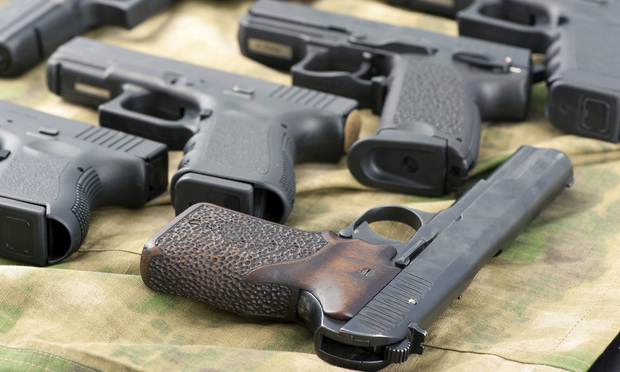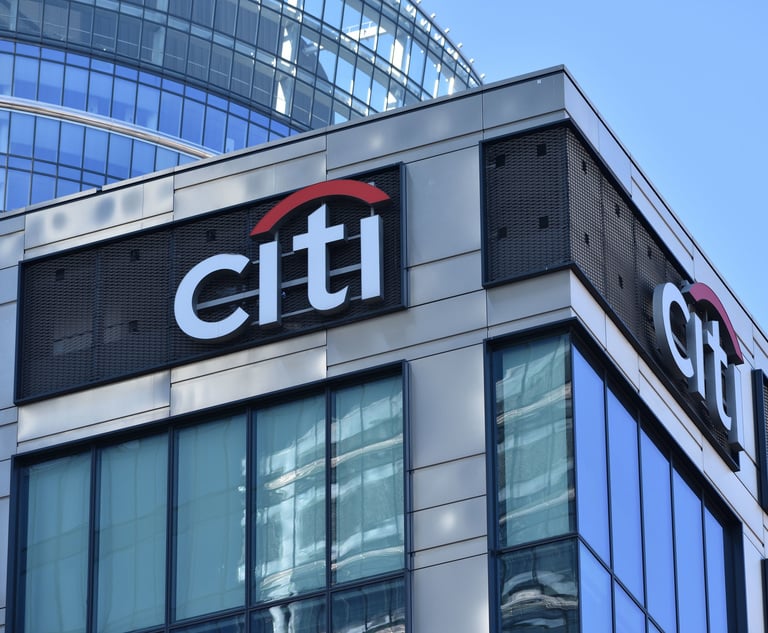NY Regulator Fines Insurers, Broker Over NRA-Branded Gun Owner Liability Policies
Fines and consent orders against a broker and insurers followed a DFS probe, which found that the NRA “Carry Guard” program provided liability insurance to gun owners and resident family members for legal costs connected with criminal defense in violation of state law. Meanwhile, the NRA is suing the broker in federal court for discontinuing the program.
May 10, 2018 at 02:13 PM
6 minute read
 Photo: sundrawalex / iStockphoto.com
Photo: sundrawalex / iStockphoto.com The New York Department of Financial Services has fined an insurance broker, Lockton Affinity, $7 million in connection with sales of a National Rifle Association-branded “Carry Guard” insurance program and similar products for gun owners, and also separately fined a subsidiary of Chubb Group Holdings $1.3 million for underwriting the same type of insurance, as part of consent orders with the companies.
Financial Services Superintendent Maria Vullo said in a statement earlier this week the actions followed a DFS probe, which found that the NRA “Carry Guard” program sold by the Chubb subsidiary Illinois Union and broker Lockton Affinity provided liability insurance to gun owners and resident family members for legal costs connected with criminal defense for using a legally owned firearm, violating state law. Lockton Affinity is licensed as an excess lines insurer in New York. The NRA is not licensed to operate as a business in New York state, DFS said.
Vullo said, “DFS will not tolerate conduct by any entity, licensed or otherwise, in contravention of New York Insurance Law, especially when that conduct is such an egregious violation of public policy designed to protect all citizens,” in an announcement.
An attorney for the NRA, William Brewer III, signaled a looming battle over gun liability policies on Wednesday, saying in an emailed statement, “The NRA will take appropriate steps to make sure law-abiding gun owners in New York and across the country have access to the insurance coverage they need.” The organization has filed a lawsuit in federal district court in Virginia against Lockton Affinity over its discontinuance of the NRA-branded insurance program.
The “Carry Guard” insurance policies brokered by Lockton and issued by Chubb and Illinois Union Insurance Co. provided coverage for policyholders and their family members for bail, attorney fees and retainer expenses and defense of criminal charges among other costs connected with being criminally prosecuted for using a legally owned weapon.
DFS asserts the policies violate state law because they offered defense coverage in a criminal proceeding and liability coverage for bodily injury or property damage intended by the policyholder beyond the use of reasonable force; as well as coverage for psychological counseling support, which is not permitted in excess lines coverage in the state. (Civil litigation coverage is permitted, a DFS spokesman said.) As part of the order, the insurance companies agreed to notify policyholders within 10 business days that they are canceling all Carry Guard policies within 90 days from the date of notice, and returning the premiums.
Dean Davison, senior vice president for communications at Lockton Affinity, said in an emailed statement Wednesday, “When we learned of New York regulatory issues in our Affinity business in the course of an investigation by the New York DFS, we immediately went to work to begin resolving them. As part of our settlement, we will continue to cooperate with the New York regulators to remediate any issues or concerns.”
Following the Parkland, Florida, mass school school shooting, Lockton notified the NRA in February that it would no longer broker NRA co-branded insurance programs. On May 4, the NRA filed a federal civil lawsuit (1:18 cv-542-AJT/TCB) against Lockton in the Eastern District of Virginia, Alexandria division, alleging the brokerage breached its contract with the organization by discontinuing the programs. A Lockton spokesman said it was not appropriate to comment on pending litigation.
NRA counsel Brewer, partner at Brewer, Attorneys & Counselors in New York, said in an emailed statement Wednesday of the lawsuit: “The NRA believes that Lockton violated its fiduciary obligations—to the detriment of the organization, insurance program it was entrusted to run, and the policyholders who obtained protections by those insurance products.” He said Lockton had provided expertise and various insurance products with the NRA for more than 20 years. “For reasons that are unclear to us—and were never communicated to the NRA in accordance with Lockton's contractual obligations—the company is beating a retreat from its prior advice that these products complied with applicable state regulations in all respects.”
Meanwhile, Reuters reported on Wednesday that Lloyd's of London also announced that it would tell its syndicates to stop writing or offering all insurance made available or endorsed by the NRA. The company said it also is under inquiry by New York's DFS. Chubb provided notice in October 2017 that it was voluntarily terminating its participation nationally in the Carry Guard program, a spokesman said.
Lockton Affinity and the NRA wrote or offered at least 11 other firearms-related insurance programs to NRA members in New York state from January 2000 to March 2018, issuing more than 28,000 policies and collecting more than $12 million in premiums during that period, according to the consent order. Chubb, Illinois Union and Lockton said they had sold 680 Carry Guard policies between April and November 2017 to New York residents but had received no claims. The NRA also received royalties from the program.
Chubb and Illinois Union agreed under their consent order to stop selling “Carry Guard” policies in New York state or to its residents. The companies also agreed not to enter into any other agreements for NRA co-branded insurance in New York. Additionally, Lockton Affinity agreed in its consent order not to distribute policies from other insurers for residents that provide the banned coverages.
Chubb said in an emailed statement Wednesday about the DFS order that “Chubb at all times intended and believed its coverage to be in full compliance with New York law. Chubb believes that this settlement is the best way to resolve the coverage questions raised by the department and is fully committed to cooperating with the department to remediate any issues or concerns regarding the Carry Guard program.”
Kevin Rampe, Chubb Group general counsel, and John Mulhern of Drinker Biddle & Reath represented Chubb and Illinois Union in the consent order, which was signed by Joseph Wayland, executive vice president and general counsel of Chubb Group Holdings.
Scott Edelman of Milbank, Tweed, Hadley & McCloy and Andrew Holland of Sidley Austin represented Lockton Companies LLC and Lockton Affinity in the consent order, which was signed by William Humphrey, secretary of Lockton Affinity.
This content has been archived. It is available through our partners, LexisNexis® and Bloomberg Law.
To view this content, please continue to their sites.
Not a Lexis Subscriber?
Subscribe Now
Not a Bloomberg Law Subscriber?
Subscribe Now
NOT FOR REPRINT
© 2025 ALM Global, LLC, All Rights Reserved. Request academic re-use from www.copyright.com. All other uses, submit a request to [email protected]. For more information visit Asset & Logo Licensing.
You Might Like
View All
New York-Based Skadden Team Joins White & Case Group in Mexico City for Citigroup Demerger

Bankruptcy Judge Clears Path for Recovery in High-Profile Crypto Failure
3 minute read
US Judge Dismisses Lawsuit Brought Under NYC Gender Violence Law, Ruling Claims Barred Under State Measure
Trending Stories
- 1New York-Based Skadden Team Joins White & Case Group in Mexico City for Citigroup Demerger
- 2No Two Wildfires Alike: Lawyers Take Different Legal Strategies in California
- 3Poop-Themed Dog Toy OK as Parody, but Still Tarnished Jack Daniel’s Brand, Court Says
- 4Meet the New President of NY's Association of Trial Court Jurists
- 5Lawyers' Phones Are Ringing: What Should Employers Do If ICE Raids Their Business?
Who Got The Work
J. Brugh Lower of Gibbons has entered an appearance for industrial equipment supplier Devco Corporation in a pending trademark infringement lawsuit. The suit, accusing the defendant of selling knock-off Graco products, was filed Dec. 18 in New Jersey District Court by Rivkin Radler on behalf of Graco Inc. and Graco Minnesota. The case, assigned to U.S. District Judge Zahid N. Quraishi, is 3:24-cv-11294, Graco Inc. et al v. Devco Corporation.
Who Got The Work
Rebecca Maller-Stein and Kent A. Yalowitz of Arnold & Porter Kaye Scholer have entered their appearances for Hanaco Venture Capital and its executives, Lior Prosor and David Frankel, in a pending securities lawsuit. The action, filed on Dec. 24 in New York Southern District Court by Zell, Aron & Co. on behalf of Goldeneye Advisors, accuses the defendants of negligently and fraudulently managing the plaintiff's $1 million investment. The case, assigned to U.S. District Judge Vernon S. Broderick, is 1:24-cv-09918, Goldeneye Advisors, LLC v. Hanaco Venture Capital, Ltd. et al.
Who Got The Work
Attorneys from A&O Shearman has stepped in as defense counsel for Toronto-Dominion Bank and other defendants in a pending securities class action. The suit, filed Dec. 11 in New York Southern District Court by Bleichmar Fonti & Auld, accuses the defendants of concealing the bank's 'pervasive' deficiencies in regards to its compliance with the Bank Secrecy Act and the quality of its anti-money laundering controls. The case, assigned to U.S. District Judge Arun Subramanian, is 1:24-cv-09445, Gonzalez v. The Toronto-Dominion Bank et al.
Who Got The Work
Crown Castle International, a Pennsylvania company providing shared communications infrastructure, has turned to Luke D. Wolf of Gordon Rees Scully Mansukhani to fend off a pending breach-of-contract lawsuit. The court action, filed Nov. 25 in Michigan Eastern District Court by Hooper Hathaway PC on behalf of The Town Residences LLC, accuses Crown Castle of failing to transfer approximately $30,000 in utility payments from T-Mobile in breach of a roof-top lease and assignment agreement. The case, assigned to U.S. District Judge Susan K. Declercq, is 2:24-cv-13131, The Town Residences LLC v. T-Mobile US, Inc. et al.
Who Got The Work
Wilfred P. Coronato and Daniel M. Schwartz of McCarter & English have stepped in as defense counsel to Electrolux Home Products Inc. in a pending product liability lawsuit. The court action, filed Nov. 26 in New York Eastern District Court by Poulos Lopiccolo PC and Nagel Rice LLP on behalf of David Stern, alleges that the defendant's refrigerators’ drawers and shelving repeatedly break and fall apart within months after purchase. The case, assigned to U.S. District Judge Joan M. Azrack, is 2:24-cv-08204, Stern v. Electrolux Home Products, Inc.
Featured Firms
Law Offices of Gary Martin Hays & Associates, P.C.
(470) 294-1674
Law Offices of Mark E. Salomone
(857) 444-6468
Smith & Hassler
(713) 739-1250







